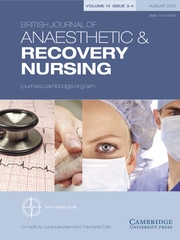‘No Excuse!’
A month ago, I found myself in the extremely lucky position of having been sent on behalf of my unit to ‘The American Society of Peri-anaesthesia Nurses’ Annual Conference in Washington D.C. As part of this programme, we were to attend a motivational talk by Jay Rifenbary, author and President of a New York-based training and development centre.
Before I had even touched down on the runway of Dulles International airport, I had been plagued by doom and gloom from every corner of the media; ‘Credit Crunch’ this, and ‘Economic Meltdown’ that. I wondered how I would find my good friend America this time, despite the new optimism in the wake of the Obama inauguration. I rather considered that it was going to be a less joyous trip than normal. That was until I sat and listened to Jay, a former airborne ranger, military commander, sales professional, corporate manager and entrepreneur, to name a few of his professions.
I admit to being quite impenetrable, previously, when it came down to motivational speaking, whether it be due to my British heritage or just as a nurse working long hours in the NHS; I have always found it a little difficult and possibly uncomfortable to place in my thought processes. Jay’s session was dedicated to assisting individuals regarding their personal and professional development and to improving the development of organisations and institutions. I had always considered that these two to be very separate topics, with personal and professional development on one hand and the development of an organisation’s values on the other. However, Jay’s ‘No excuses’ policies have led me to the conclusion that you cannot have one without the other, and that all values set by an individual in their personal life should be mirrored in that of the profession and organisation they work for.
Jay’s talk was a ‘no holds barred’ trip down the road of responsibility and accountability, with ‘whining’ and moaning never being an option. We have all felt like saying, ‘I’m not going to worry about that, it’s not my job’ and ‘That’s not my problem’, (I have certainly been guilty in times of stress) and to a certain degree I believe it to be a coping mechanism. After all, we can’t be responsible for everything we see at work.
Or can we? Jay firmly believes that this is the time for responsibility, a ‘no excuses’ approach to work, with integrity, honesty and accountability at the heart of the individual and organisation. This sounded very tiring to me and I began thinking about all the times I had left work feeling down about the situations or conversations that come about from working within a team and for a public service with limited resources and staffing deficits. How could we possibly be expected to carry this weight of responsibility around with us? As I was thinking this, Jay reassured us with a sentence that will stay with me for a very long time.
‘Do not let people live in your head rent-free.’
It all became clear then. One is only able to do this if we abandon the negativity that can so often claim a nurse and remove the conversations, incidences and in some cases, people that hinder our personal, professional and organisational values. As PACU and Anaesthetic nurses we know that the environments in which we work can have their own unique stresses. After all, the highest rates of horizontal violence can be found in the peri-operative environment.
As the talk drew to a close, Jay, as if anyone was left unconverted, left us with an analogy from his Military days. He spoke of his first parachute jump and all the checks that were in place to ensure a safe jump and landing so that they could wait for their mission instructions. The individual directly behind you in the ‘jumping line’ was responsible for checking the parachute and leads of the man in front. He spoke excellently of how each individual was feeling at that time and how he was the first to jump. We were all on the edge of our seats as he told of how his parachute failed to open. As he plummeted towards earth he began to try and rectify the problem and did so, just in time to safely hit land and await further instruction. His message was simple. He could have plummeted to earth with thoughts of ‘how did this happen, who is to blame, I’m never going to recover from this’. Instead, he took responsibility for his own life and hit land ready for the next mission.




